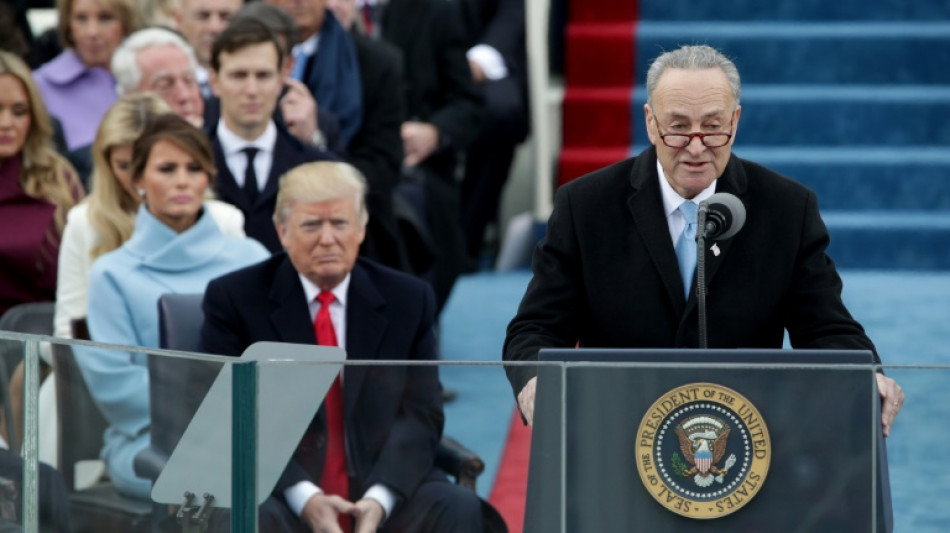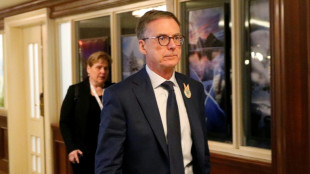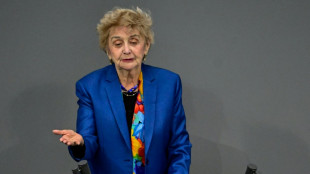
| SCS | 0.12% | 16.14 | $ | |
| RYCEF | -2.69% | 16.7 | $ | |
| CMSD | -0.19% | 24.05 | $ | |
| BCC | -1.12% | 80.835 | $ | |
| CMSC | -0.29% | 23.73 | $ | |
| JRI | -5.27% | 12.995 | $ | |
| RBGPF | 0% | 82.4 | $ | |
| RIO | 0.18% | 93.075 | $ | |
| NGG | 0.51% | 84.74 | $ | |
| VOD | 0.41% | 14.56 | $ | |
| GSK | -1.52% | 50.039 | $ | |
| BCE | -0.5% | 25.393 | $ | |
| RELX | -2.21% | 37.53 | $ | |
| AZN | -2.34% | 93.41 | $ | |
| BTI | -0.92% | 59.792 | $ | |
| BP | 0.37% | 37.76 | $ |

US senators struggle for off-ramp as shutdown kicks in
The United States entered a government shutdown Wednesday with President Donald Trump and Democrats in an acrimonious stand-off and banking on the other side to blink first in what could be a prolonged crisis.
With the government out of money after Trump and Congress failed to agree on a funding deal, federal agencies -- except for essential services -- stopped work from midnight.
Around 750,000 public sector workers are expected to be placed on furlough -- a kind of enforced leave, with pay withheld until they return to work.
Essential workers such as the military may be forced to work without pay and some will likely begin noticing missing checks by next week.
Shutdowns are a periodic feature of gridlocked Washington, although this is the first since a record 35-day pause in 2019, when Trump was in his first term. They are unpopular because multiple services used by ordinary voters, from national parks to permit applications, become unavailable.
This time, though, the shutdown comes against a darker backdrop, with Trump racing to enact hard-right policies, including slashing entire government departments.
The White House is threatening to turn many of the furloughs into mass firings.
"A lot of good can come down from shutdowns," Trump told reporters Tuesday. "We can get rid of a lot of things that we didn't want. They'd be Democrat things."
And Democrats -- motivated by grassroots anger over expiring health care subsidies and Trump's dismantling of government agencies -- are withholding Senate votes to fund the government as leverage to try and force negotiations.
- 'Come together' -
Republicans in the House of Representative have already passed a stop-gap funding fix to keep the lights on through late November while a longer-term plan is thrashed out.
But the 100-member Senate does not have the 60 votes required to send it to Trump's desk and Democrats say won't help unless Republicans compromise on their planned spending cuts -- especially in health care.
"It's the job of senators on both sides of the aisle to come together," top Senate Democrat Chuck Schumer told CNN.
"And here's what we hope now -- that the Republicans have seen they don't have the votes."
Senators were due to vote Wednesday on competing short-term Democratic and Republican resolutions to reopen the government, but both were rejected in Senate votes on Tuesday.
With no compromise on the table, both plans were expected to fail again.
Talks that have taken place so far have been unusually bitter, with Trump mocking Schumer and House Minority Leader Hakeem Jeffries on social media.
- 'Hostage-taking' -
Senate Republican leaders, who have just one rebel in their own ranks, only need eight Democrats to join the majority and rubber-stamp the House-passed bill.
They got three moderates to cross the aisle in Tuesday's vote and will hope to peel off five more as the shutdown starts to bite.
Meanwhile Democrats will be acutely aware that the party trying to force policy changes by holding back votes on government funding has usually failed in the past.
"As the political pressure builds, and as we continue to have these negotiations, you're going to see more and more Democrats come to this side of reason and reopen the government," Republican Vice President JD Vance told Fox News.
He said he would be happy to talk to Democrats "right now" about health care subsidies but would not bow to Democratic "hostage taking."
Congress is out Thursday for the Jewish Yom Kippur holiday but the Senate returns to work on Friday and may be in session through the weekend. The House is not due back until next week.
N.Tsakalidis--AN-GR



